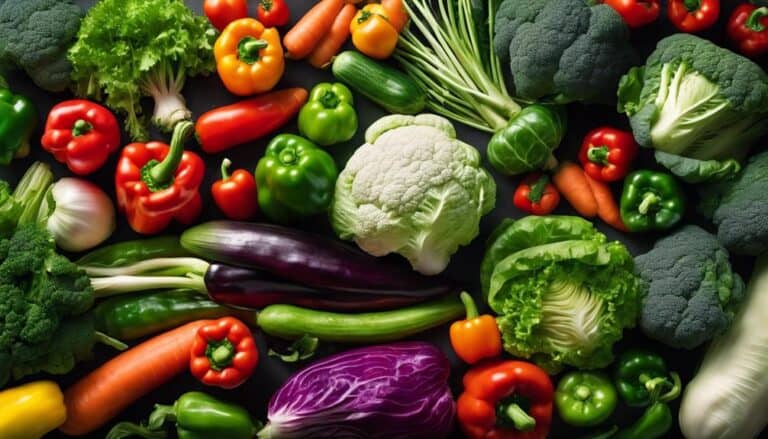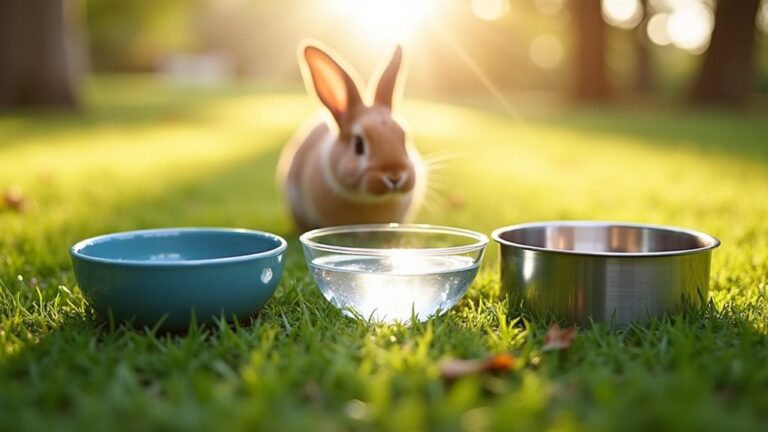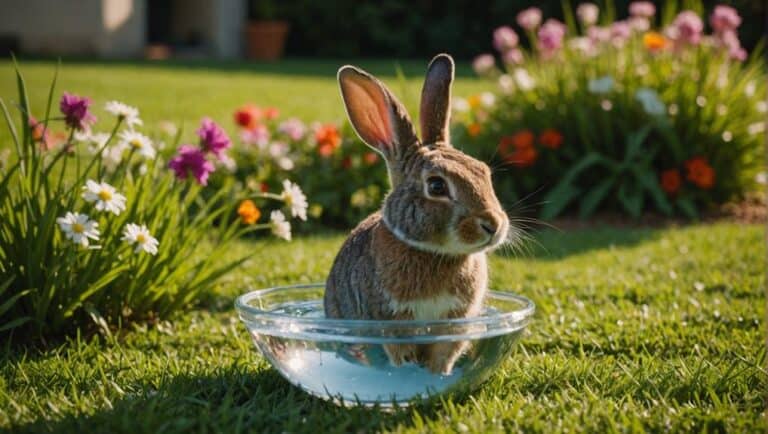If you're hopping around trying to figure out if your fluffy friend should munch on organic or commercial bunny food, the decision may seem overwhelming.
The debate between these two options is not just about what's trendy but also about what's truly beneficial for your bunny's well-being.
Before you make the leap into choosing a diet, consider the implications of each choice on your furry companion's health and happiness.
Your bunny's diet could be more than just a meal—it could be the key to a healthier and happier life.
Contents
- 1 Key Takeaways
- 2 Organic Bunny Food Benefits
- 3 Commercial Bunny Food Advantages
- 4 Nutritional Comparison: Organic Vs. Commercial
- 5 Cost Analysis: Organic Vs. Commercial
- 6 Health Implications of Organic Food
- 7 Health Implications of Commercial Food
- 8 Environmental Impact: Organic Vs. Commercial
- 9 Making the Best Choice for Your Bunny
- 10 Frequently Asked Questions
- 11 Is Organic Bunny Food More Eco-Friendly Than Commercial Options?
- 12 Conclusion
Key Takeaways
- Organic bunny food prioritizes natural cultivation for digestive health and overall well-being.
- Commercial bunny food offers tailored nutrition and convenience for meeting rabbits' specific needs.
- Organic food promotes higher quality ingredients despite cost, enhancing well-being.
- Consider protein levels, sourcing, and environmental impact to choose the best bunny food.
Organic Bunny Food Benefits
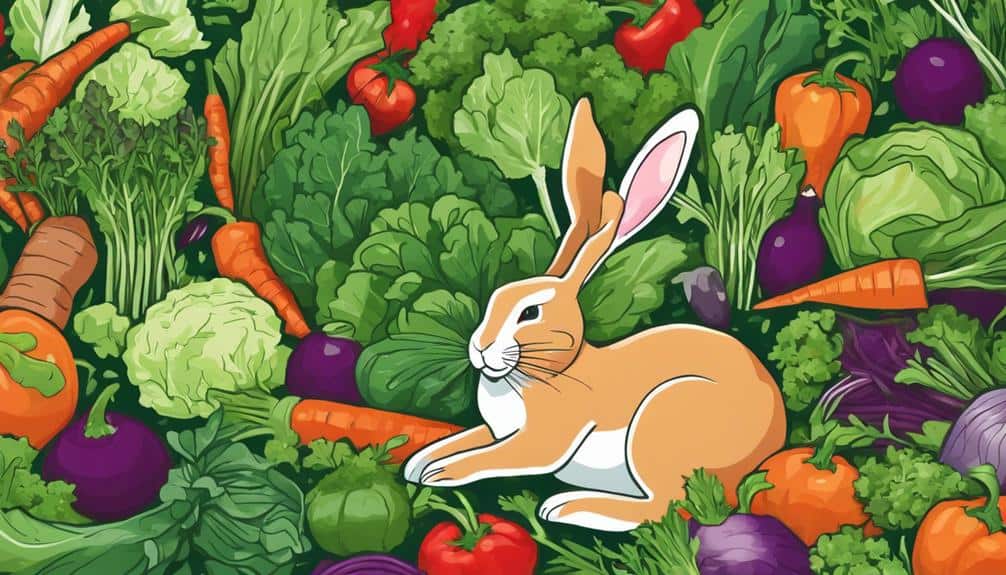
Organic bunny food offers a multitude of benefits that stem from its cultivation without synthetic pesticides, herbicides, or fertilizers, ensuring a healthier and more sustainable diet for your furry companions.
One key ingredient often found in organic bunny food is Timothy Grass. This grass is rich in fiber, essential for promoting healthy digestion in bunnies. The high fiber content aids in preventing gastrointestinal stasis, a common issue in rabbits. Additionally, Timothy Grass provides a good source of silica, which is important for maintaining dental health in bunnies by aiding in the wear of their continuously growing teeth.
Furthermore, organic farming practices prioritize soil health and biodiversity, leading to nutrient-rich Timothy Grass. This grass contains higher levels of essential nutrients, such as calcium and phosphorus, important for strong bones and teeth in bunnies. By choosing organic bunny food containing Timothy Grass, you're providing your furry friends with a diet that supports their overall well-being and longevity.
Commercial Bunny Food Advantages
When considering the nutritional needs of your rabbits, commercial bunny food offers a scientifically formulated diet to guarantee they receive essential vitamins, minerals, and nutrients. Commercial bunny food provides several advantages:
- Nutritional Precision: Commercial bunny food is specifically formulated to meet the exact nutritional requirements of rabbits, helping to assure deficiencies and promote overall health.
- Quality Assurance: Many commercial bunny foods undergo rigorous testing to assure consistency and quality in each batch, giving you peace of mind that your rabbits are getting the nutrition they need.
- Convenience: The ease of feeding commercial bunny food eliminates the need for complex meal planning, making it simple for rabbit owners to provide a well-rounded diet without added stress.
Choosing commercial bunny food can offer your rabbits a balanced and convenient diet that supports their health and well-being effectively.
Nutritional Comparison: Organic Vs. Commercial

Considering the dietary requirements of your rabbits, it's important to understand the nutritional disparities between organic and commercial bunny food options.
Organic bunny food is crafted from natural, non-GMO ingredients sans synthetic chemicals or pesticides. It typically contains higher fiber content and fewer additives, catering to your rabbits' digestive health.
On the other hand, commercial bunny food is meticulously formulated to meet specific nutrient levels essential for your rabbits' well-being. These products undergo stringent quality control measures to guarantee consistent nutritional value in every serving.
When comparing the two options, both organic and commercial bunny foods can offer a balanced diet for your furry companions. However, individual preferences and health conditions of your rabbits might influence the choice.
Note that Timothy hay, often included in both organic and commercial bunny foods, is a critical component for your rabbits' dietary needs, providing essential fiber and promoting proper digestion. Make an informed decision based on your rabbits' specific requirements and consult with a veterinarian if needed.
Cost Analysis: Organic Vs. Commercial
With varying price points influenced by factors such as brand, quality, and quantity, the cost disparity between organic and commercial bunny food can be significant. When contemplating the cost analysis between organic and commercial bunny food, it's essential to weigh the financial implications alongside the health benefits for your furry friend. Here are some key points to contemplate:
- Organic Bunny Food:
- While more expensive, organic options may promote better digestive health due to the absence of chemicals and pesticides.
- Higher quality ingredients in organic food can lead to improved overall well-being for your rabbit.
- Some rabbit owners find the investment in organic food worthwhile for long-term health benefits.
When budget constraints are a concern, opting for Commercial Bunny Food might be a more practical choice for many. However, be mindful of potential additives or lower quality ingredients that could impact your bunny's digestive health. Ultimately, the decision between organic and commercial bunny food should balance both cost-effectiveness and the well-being of your beloved pet.
Health Implications of Organic Food
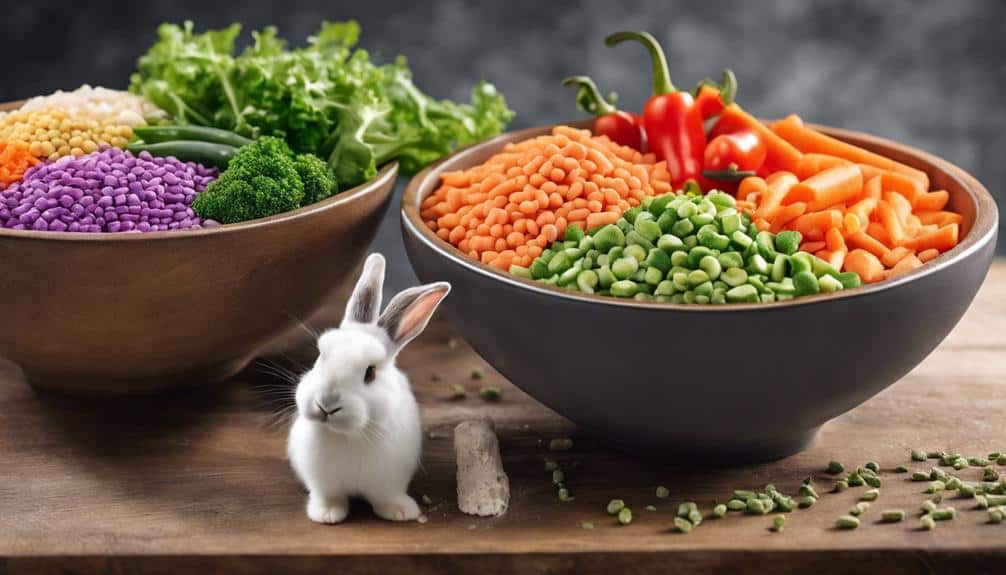
To further explore the benefits of organic bunny food, let's investigate its profound impact on the health and well-being of your rabbit. Choosing organic food for your rabbit can notably contribute to their overall health. Organic bunny food is free from synthetic pesticides, herbicides, and GMOs, which reduces potential health risks associated with chemical exposure.
Additionally, organic bunny food often contains higher levels of essential nutrients, vitamins, and minerals compared to conventional commercial food. The absence of artificial additives and preservatives in organic bunny food can further enhance your rabbit's well-being.
In addition, organic bunny food promotes sustainable farming practices that prioritize animal welfare, environmental conservation, and biodiversity. By opting for organic food, you aren't only ensuring a higher quality and safer diet for your rabbit but also supporting ethical and transparent food production methods.
Prioritizing your rabbit's health by choosing organic food is a wise and caring decision.
Health Implications of Commercial Food
When choosing commercial rabbit food for your furry friend, be wary of potential health implications. Artificial additives, preservatives, and fillers found in some commercial options can have negative effects on your rabbit's well-being.
High levels of sugar or fat in certain commercial foods may contribute to obesity and related health issues in rabbits.
Commercial Food Additives
What potential health risks do additives in commercial rabbit foods pose for the overall well-being of rabbits?
Commercial rabbit foods may contain additives like artificial colors, flavors, and preservatives, which can have detrimental effects on your bunny's health. Here are some health implications of additives in commercial foods:
- Digestive Issues: Additives in commercial rabbit foods can sometimes lead to digestive problems.
- Allergic Reactions: Some rabbits may be sensitive to the artificial ingredients in commercial foods, leading to allergic reactions.
- Long-Term Health Impact: Continuous consumption of commercial foods with additives may affect your rabbit's overall health and well-being over time.
Make informed choices for your furry friend's diet to guarantee their prime health and happiness.
Nutrient Deficiencies
Nutrient deficiencies resulting from commercial rabbit food can have significant health implications for your bunny, including low fiber, high sugar content, and inadequate vitamins and minerals. Commercial foods often contain high levels of simple carbohydrates and low-quality ingredients that can lead to digestive issues, obesity, dental problems, and overall poor health in rabbits.
These deficiencies are concerning as they can impact your rabbit's well-being and longevity. To combat this, it's essential to supplement your rabbit's diet with high-fiber foods like alfalfa hay, which can help prevent digestive issues and promote overall gut health.
Environmental Impact: Organic Vs. Commercial
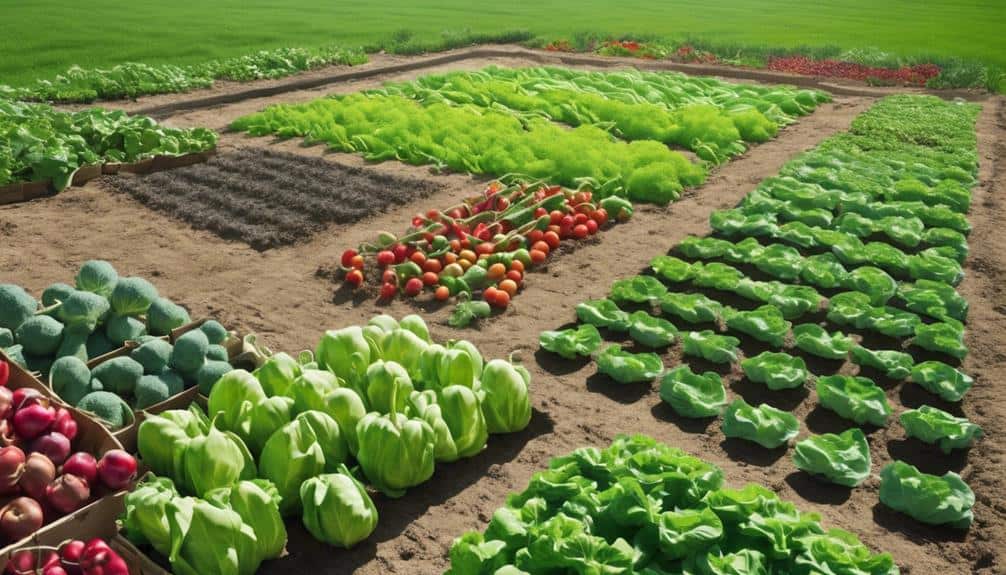
When comparing the environmental impact of organic versus commercial bunny food, consider the soil health benefits of organic farming methods.
Analyze the use of pesticides in commercial production and how it affects ecosystems.
Evaluate the sustainability practices employed in both types of bunny food production to make an informed decision on the best choice for your pet and the environment.
Soil Health Comparison
Comparing the environmental impact on soil health between organic and commercial bunny food production reveals significant differences in their approaches and outcomes. When considering soil health:
- Organic bunny food production promotes soil health by avoiding synthetic chemicals and pesticides that harm soil organisms.
- Organic farming practices for bunny food prioritize soil conservation, crop rotation, and composting to maintain soil fertility and structure.
- Commercial bunny food production often relies on chemical fertilizers and pesticides, which can lead to soil degradation and loss of biodiversity.
Choosing organic bunny food supports sustainable agriculture practices that prioritize soil health, benefiting the environment and future generations. By opting for organic options, you contribute to maintaining a healthy environment for young rabbits and other wildlife.
Pesticide Use Analysis
Choosing between organic and commercial bunny food directly impacts the environmental footprint regarding pesticide use. Organic bunny food is free from synthetic pesticides, reducing potential harm to the ecosystem compared to commercial options.
Pesticide residues found in commercial bunny food from conventional farming practices can leach into soil and water sources, affecting biodiversity and soil health. Organic farming methods prioritize sustainability, natural pest control, and soil health, benefiting the environment where bunny food ingredients are grown.
Sustainability Practices Evaluation
Organic bunny food production emphasizes sustainable farming practices, prioritizing natural methods over synthetic inputs to reduce environmental impact. When considering sustainability practices, it's important to evaluate how rabbit food is produced to make an informed choice. Here's why sustainability matters:
- Resource Conservation: Organic bunny food production often conserves resources by avoiding synthetic pesticides and fertilizers, reducing the strain on the environment.
- Biodiversity Support: Choosing organic bunny food can support biodiversity through natural farming techniques that preserve soil health and wildlife habitats.
- Reduced Pollution: Commercial bunny food production may contribute to pollution through intensive farming practices, while organic options typically have a lower environmental impact.
Prioritizing sustainability in what rabbits eat can positively impact the environment and promote ethical consumption choices.
Making the Best Choice for Your Bunny
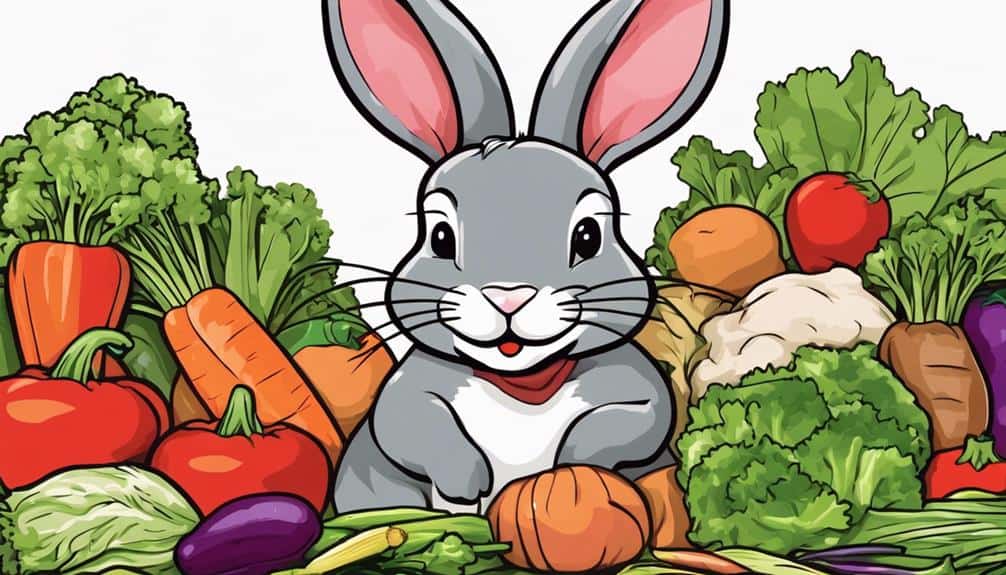
When deciding on the best food for your bunny, consider both organic and commercial options to guarantee your rabbit's excellent health and well-being. Protein level is important for your bunny's diet, and both organic and commercial foods offer balanced protein content.
Organic bunny food, free from synthetic pesticides and GMOs, can provide a more natural option with potentially higher nutritional quality. On the other hand, commercial bunny food is formulated to meet specific nutritional needs, ensuring consistent levels of protein, fiber, and essential vitamins. Commercial options often include added nutrients like probiotics and prebiotics, promoting digestive health and overall well-being in rabbits.
The choice between organic and commercial bunny food ultimately depends on your preferences, budget, and your rabbit's individual dietary requirements. Consider factors such as the nutritional content, sourcing practices, and any specific health considerations your bunny may have when making this decision.
Frequently Asked Questions
What Is the Healthiest Food for Bunnies?
For the healthiest food for bunnies, natural foraging is essential. Incorporate a variety of fresh vegetables and high-quality hay to guarantee a balanced diet. Consult with a vet to tailor the food to your bunny's specific needs for peak health and happiness.
What Brand of Food Is Best for Rabbits?
When deciding between organic and pellet rabbit foods, you might believe the organic option is best. However, reputable brands like Allen & Page, Oxbow Essentials, or Burgess Excel offer balanced nutrition essential for bunnies.
What Is the Top Best Rabbit Food?
When deciding on the top rabbit food, consider the benefits of fresh versus processed options. Fresh foods like timothy hay and vegetables offer natural nutrients important for your bunny's health. Processed pellets can provide a balanced diet conveniently.
What Rabbit Food Do Vets Recommend?
For a rabbit, vet-approved diets are essential for good health. Trusted brands like Oxbow, Sherwood, and Small Pet Select meet essential nutritional criteria. They provide balanced diets with proper protein, fiber, and vitamins. Prioritize your bunny's well-being.
Is Organic Bunny Food More Eco-Friendly Than Commercial Options?
When it comes to feeding your pet bunny, choosing organic food can be a more eco-friendly option compared to commercial alternatives. Organic bunny food is made with natural and ecofriendly materials for bunny homes, which can help reduce the environmental impact of farming practices.
Conclusion
To wrap up, when deciding between organic and commercial bunny food, consider your bunny's specific needs and preferences. While organic food may offer higher quality ingredients, commercial food also meets essential nutritional standards.
Ultimately, the best choice for your furry friend depends on factors such as cost, health implications, and environmental impact. Remember, it's important to consult with a veterinarian to make sure your bunny's diet is well-balanced and tailored to their individual needs.
So, hop to it and make the best choice for your beloved bunny!


